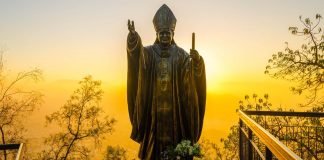Let’s read Genesis with “new eyes”
In the spring of 2022, I interviewed the venerable professor of Hebrew exegesis, Jacques Doukhan, for the second time. Ten years before, in our first interview, we discussed his life: his beginnings in a Jewish family in Constantine, Algeria, his studies in France, Switzerland and the United States, his work as a teacher and author. This time we talked about the study that...
Created with a need for rest
Work has been part of God's plan for mankind since creation, but so has rest. Setting wise boundaries between work and rest is not only a successful strategy for maintaining our productivity, it also reflects on the health of our relationship with God and our fellow people.
Deadly ideas
“To them I will give within my temple and its walls a memorial and a name better than sons and daughters; I will give them an everlasting name that will endure forever” (Isaiah 56:5).
Good or bad: How we come to love negative characters
It is as surprising as it is real: negative characters like Dexter Morgan, from the eponymous Dexter, and Walter White, from Breaking Bad, have been cropping up in popular culture more and more often lately. Since when, how, and why have anti-heroes gained so much popularity?
Confession: in search of the ultimate goal
It is important to have a purpose in life, yet this is not enough. It really matters what your purpose is.
Tutorial: How to easily spot fake news
In an interview published by Inc.com, 24-year-old Romanian Ovidiu Dobrota, from Oradea, Romania, boasted that his fake news site Ending The Fed had a substantial impact in supporting Donald Trump in the presidential elections. According to a Buzzfeed analysis, his boasting is well-founded.
Single parents and children’s religious education
Is it possible, as single parents, to instil in our children a love for God and for the church?
Never enough: an imperfect article on perfectionism
The end of the line for Christian perfectionism is not perfection, but atheism. This is because what we imagine to be the constant unsatisfied look of God upon us, is a burden too heavy for any human to bear.
The search for meaning
In The Simpsons episode entitled “Homer the Heretic,” Homer Simpson has a conversation with God.
Antibiotics: Blind optimism is dangerous
The increased frequency with which doctors are encountering antibiotic-resistant bacteria is worrying. And it could affect an already precarious medical field—cancer treatment.
12,000 people for one child
Until 2013, we only knew about the existence of Batman, the famous comic book hero, but almost a decade ago the whole world also got to know Batkid, a real boy from San Francisco, USA, whose story confirms the saying that “truth is stranger than fiction.”
Relics: The miracle of faith or its illusion?
October 13, 1247. In the Westminster Cathedral in London, the crowd was eagerly awaiting the revelation of a great mystery.
Anti-papism: realism or paranoia? (II)
In the first part of this series, we familiarised ourselves with the classical Protestant perception of the concept and prophetic figure of the Antichrist, and evaluated the classical identification of the Antichrist with the papacy. Further analysis becomes even more intriguing with a close reading of the major biblical prophecies about the Antichrist.
In life, you have to take everything as it comes and have no regrets. True or false?
He had played the lottery for years, using the same numbers every time. But on the one day that he forgot to buy a ticket, the draw revealed the winning numbers to be exactly his "lucky" numbers.
My daily horoscope really fits! True or false?
The daily horoscope is sometimes seen as a quasi-scientific method of predicting the future, other times as a preoccupation of childish adults, a way of calming one’s curiosity about tomorrow.


























